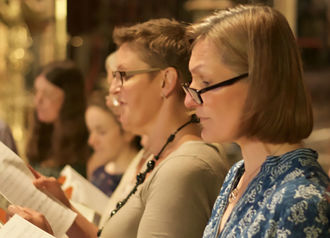|
Messiah is deeply embedded into the musical DNA of English-speaking singers, and for our performance next week we’re working hard at overcoming some of our own preconceptions about how particular movements should be sung, coming afresh to Handel’s masterpiece – and ditching some firmly ingrained habits along the way.
We’ll be helped in this by new voices, including our six young soloists making their Messiah debuts, and some of our own members, among them alto Päivi-Sisko Eerola from Finland, who has written this post for us about singing Messiah for the first time: |
After the German Passion and a brief encounter with some Christmas carols, the choir started to tackle challenging music for our winter concert with texts in French, Italian and Latin. As we were all second-guessing how the right pronunciation should go, I was thinking should I follow my English fellow choristers or stick to my own secondary school upbringing in those languages? So, it wasn’t until our summer concert in 2014 named “We who are left” (after the text by poet Wilfred Wilson Gibson, which was set to music by Francis Pott) that I learned that my fellow Durham Singers are pretty consistent when it comes to singing music with an English text. I was immediately in capable hands when following the other singers when rehearsing the works by Richard Rodney Bennett and Francis Pott.
Since then we have sung music set to texts in Russian (the All-night vigil by Sergei Rachmaninov) and Finnish (Rakastava by Jean Sibelius) – and I must say with the confidence of a native speaker of Finnish that the latter performance couldn’t have sounded more authentic. But my choir definitely works in its comfort zone in English music. It’s easy to go along when everybody else already knows how to pronounce the funny old English words with great confidence. The drawback of this certainty is the speed that we go through the familiar music in rehearsals. For somebody who enjoys the rehearsals more than the actual performances I get a feeling we don’t always linger and bathe in the fine harmonies long enough to be purified.
I am experiencing this again with Handel’s oratorio Messiah. I have never performed it – not even the “Hallelujah” chorus. Everyone knows it already, so instead of a gentle rehearse, we run through the music at full speed while I’m singing it for the first time. This preference to sing Messiah at top speed and top volume with a sudden leap off your stool as soon as our pianist hits the first chords of the Hallelujah chorus reminds me of the full circus surrounding the Last Night of the Proms, when the audience is not sitting back and quietly drawing in the music but goes ahead and takes part by whistling and humming along.
You had a chance to sing-along and take part in our Full English Messiah on 15th October, at Elvet Methodist Church, Durham. It was a jolly occasion. So many people turned up and enjoyed a bit of rehearsing and a run-through with us. What we missed on that day was the full orchestra and the full line-up of our young soloists from Samling. But don’t despair, the concert day is still ahead of us. We expect to see you on Saturday, 19th November, at Durham Cathedral, concert starting at 7:00 pm.
In addition to the reminders of the August-time BBC Proms, for me there are two more references to Modern British Culture in Messiah that Handel could not predict, but which make me giggle a little whenever we turn the page. The first one is at the end of Part II in the Hallelujah Chorus. When we sing: “King of the Kings”, I would love to continue: “… and Lord of the Rings” simply because it rhymes better. But we don’t. And at an earlier point of Part II when we have just finished singing furiously: “With his stripes we are healed”, suddenly a Monty Python joke
kicks in where a church choir with straight faces suddenly burst into singing: “All we like sheep!”We warmly welcome you to hear our performance of Messiah. Try to hear it with fresh ears of a first-timer like me!
Päivi-Sisko Eerola

